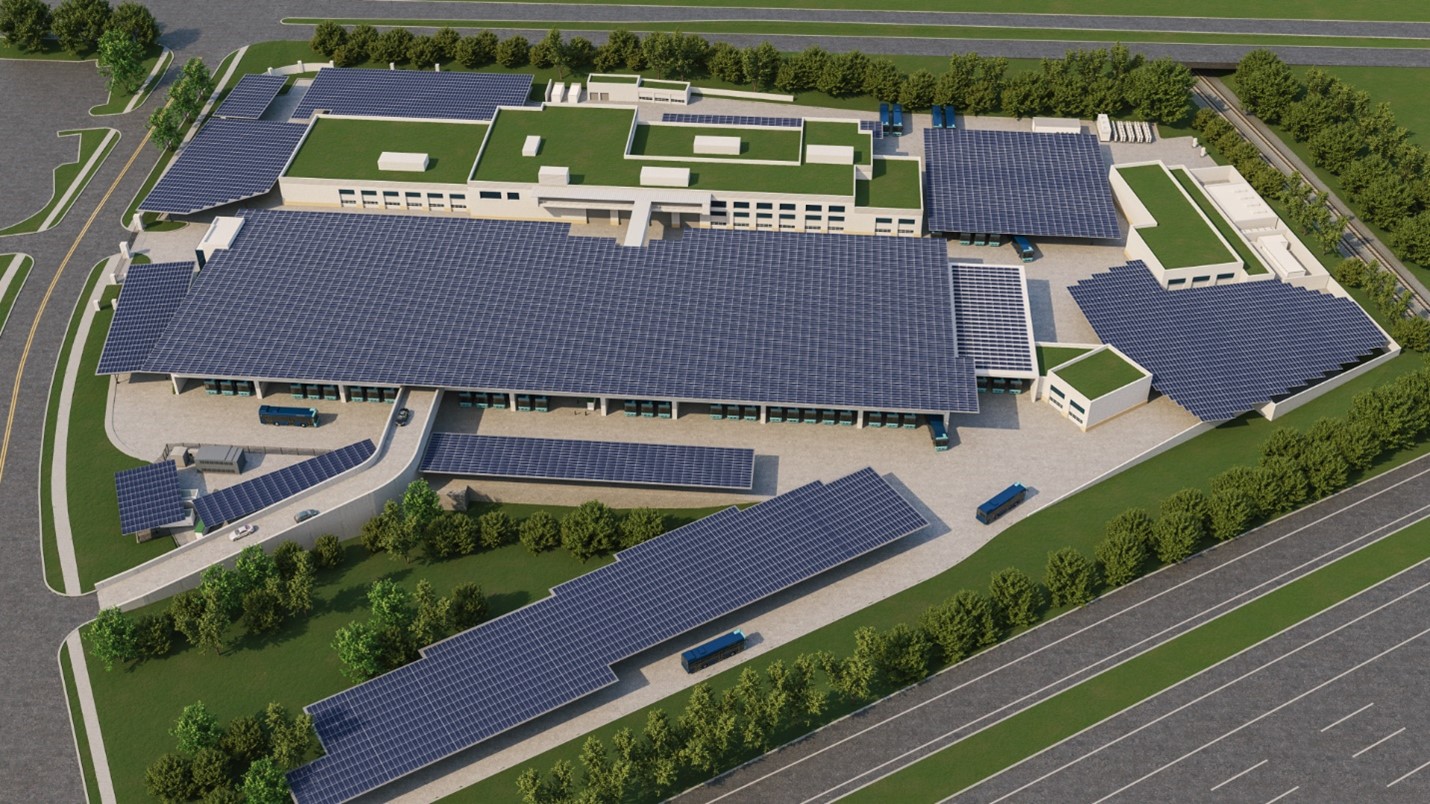Advanced Energy Projects
The Office of Energy and Sustainability (OES) develops Advanced Energy systems, sometimes referred to as “Distributed Energy Resources” (DER), that help supply the County with low or no carbon fueled electrical generating systems. These would include Solar Photovoltaic (PV) applications, Combined Heat and Power (CHP) generating systems, battery energy storage, microgrids at critical facilities, and infrastructure to support a non-carbon fueled transit fleet and resilience hubs.Microgrids
Microgrids are standalone on-site power generation systems that allow critical operations to run independently of the power grid. Combining technologies such as Solar PV, standalone generators including Combined Heat and Power (CHP) generation systems. Microgrids may also include battery energy storage and advanced controllers with built in cyber-security. Microgrids allow facilities to run uninterrupted during storms and other major power outages.
Microgrids - Transit Depots
The County’s David F. Bone Equipment Maintenance and Transit Operation Center (EMTOC). Is located at 16700 Crabbs Branch Way in Derwood. The County’s microgrid project will feature electric bus charging and on-site “green” hydrogen production powered by solar and battery energy storage.
By 2035, EMTOC is projected to accommodate 200 zero-emissions buses, of which most will be hydrogen fuel cell electric buses (FCEBs). The County is using FCEBs in part because FCEBs have a greater range versus battery electric buses and can thus support longer bus routes. A hydrogen FCEB is a zero-emissions vehicle, powered by hydrogen and oxygen, emitting only water.
The microgrid is a Public Private Partnership between the County and AlphaStruxure, a Schneider Electric & Carlyle JV. AlphaStruxure designed, built, owns, operates, and maintains the microgrid under a long-term Energy-as-a-Service (EaaS) contract with the County.
This EaaS contract resulted in no significant impact to the County’s capital budget. No upfront capital investment was required, and payments will be made to AlphaStruxure over the term of the contact for electrical product that is provided. This enables the County to have predictability of energy supply and long-term cost surety while providing 100% resilient operating capacity in the event of power outages.
Montgomery County is providing a sustainable model for the nation to follow. As of 2024 the project is the largest renewable energy-powered transit depot and transit depot microgrid in the nation; it is also the first facility on the East Coast to produce green hydrogen on-site. This project will both ensure that County services are resilient for the increasing potential of extreme weather due to climate change. The project also supports County’s efforts to purchase clean energy whenever feasible.
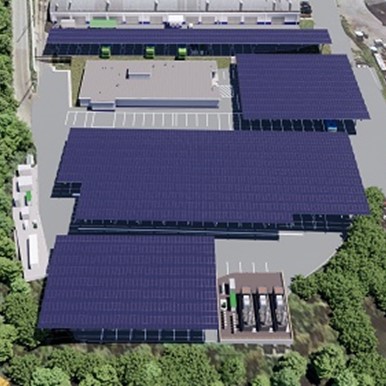
The Brookville Maintenance Facility “Smart Bus” Depot, located at 1607 Brookville Rd. in Silver Spring, MD is an integrated 6.5 MW microgrid with on-site generation, electric bus charging, Solar PV canopies, and battery energy storage. The microgrid has been in operation since October 2022. The depot services over 140 Ride-On transit diesel buses. The depot is transiting from diesel buses to battery electric buses. All transit buses at this depot will be electric buses by 2035.
The microgrid is a Public Private Partnership between the County and AlphaStruxure, a Schneider Electric & Carlyle JV. AlphaStruxure designed, built, owns, operates, and maintains the microgrid under a long-term Energy-as-a-Service (EaaS) contract with the County.
This EaaS contract resulted in no significant impact to the County’s capital budget. No upfront capital investment was required, and payments will be made to AlphaStruxure over the term of the contact for electrical product that is provided. This enables the County to have predictability of energy supply and long-term cost surety while providing 100% resilient operating capacity in the event of power outages.
Microgrids - Facilities
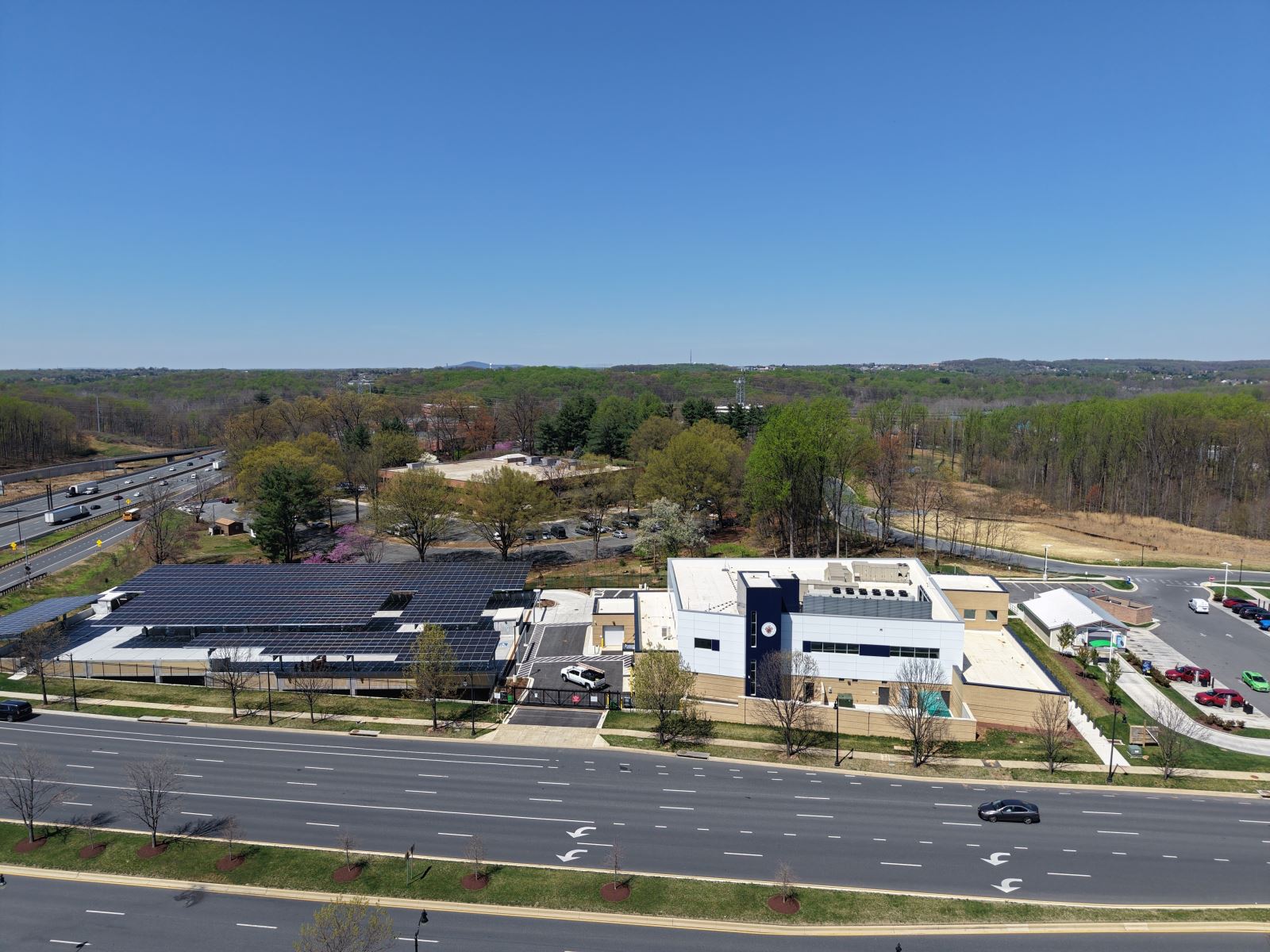
Montgomery County's new 6th District Police Station (6DPS) is pioneering a sustainable future as the first Zero Energy Public Safety facility in Maryland and on the East Coast. This cutting-edge building features a microgrid with 360 kW solar PV canopies and a 500-kW emergency natural gas generator, ensuring uninterrupted service to the community during major grid outages. The solar PV canopies atop the parking structure will generate over 100% of the station's expected annual energy use.
The 28,294 square foot, two-level building and 59,526 square foot parking structure are designed to support the Police Chief's Staffing Plan, accommodating up to 178 department staff and volunteers. The station serves the Gaithersburg, Montgomery Villages, and UpCounty region 24/7, housing the Central Traffic Unit and various special teams.
A notable aspect of this project is the Public Private Partnership between the County and GreenStruxure, which designed, built, and will operate and maintain the microgrid under a long-term Energy-as-a-Service contract. This innovative approach allowed the County to implement a zero-energy solution without significant upfront capital investment, instead paying for electricity generated on-site over the contract term.
By complying with the 2018 International Green Construction Code and the upcoming Building Energy Performance Standard, 6DPS supports Montgomery County's ambitious goal to reduce greenhouse gas emissions 100% by 2035.
This pioneering project received a $259,200 grant from the Maryland Energy Administration and embodies the County's commitment to "A Greener County" and "Safe Neighborhoods," setting a new standard for sustainable public facilities.
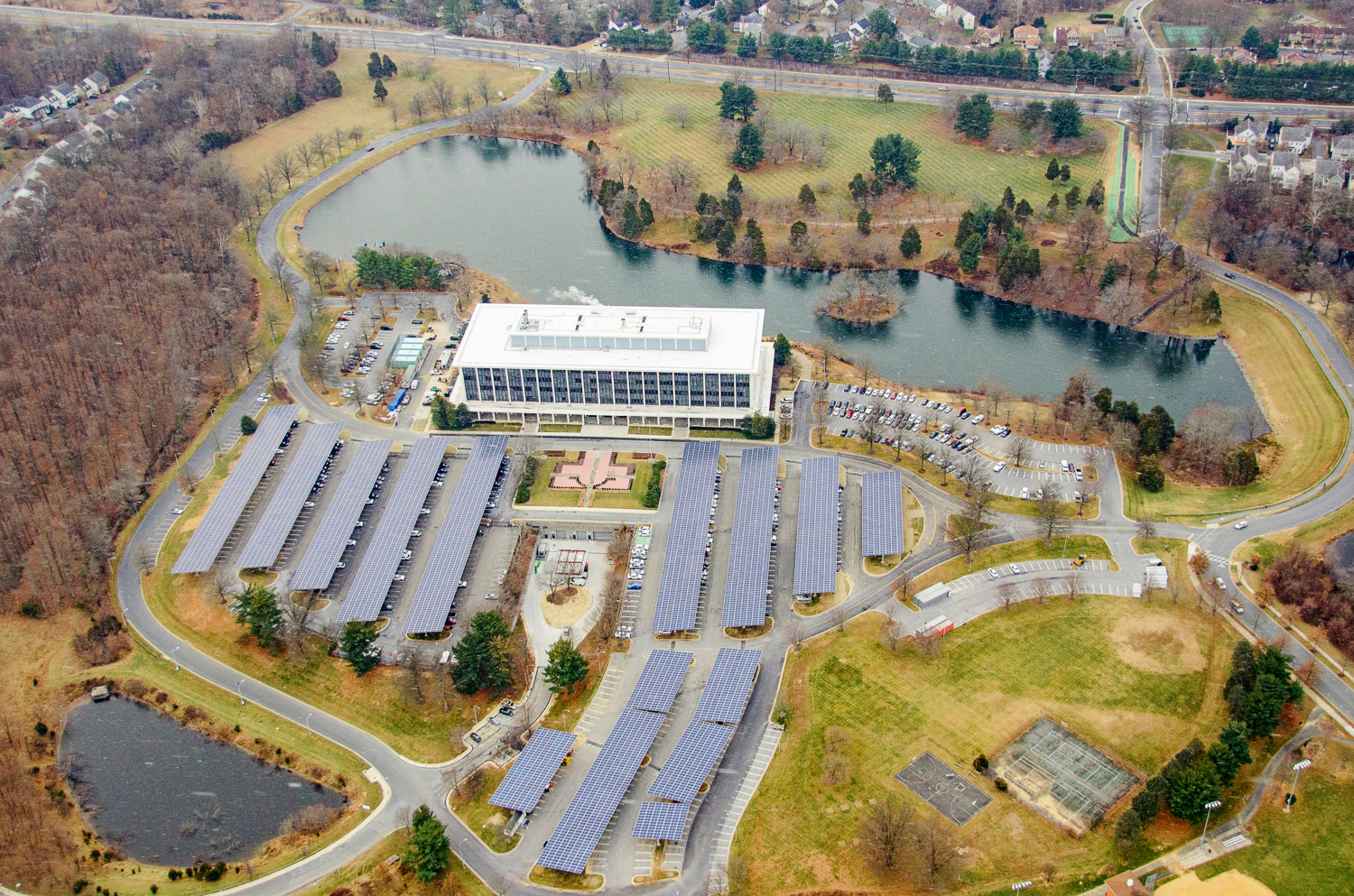
The project includes multiple clean energy technologies integrated to operate seamlessly, reducing greenhouse gas emissions by 5,900 metric tons annually, the equivalent of taking more than 1,200 cars off the road. The project design includes 2 megawatts (MW) of Solar photovoltaic (PV) canopies mounted over the existing parking lot, an 800 KW Combined Heat and Power (CHP) system, electric vehicle charging stations and a cyber security system.
The facility benefits from Maryland’s credits provided under Maryland policies that favor clean energy sources and a combined aggregate net energy metering policy which allows government organizations to credit excess generation to other facilities and receive a retail credit for each kilowatt hour generated. In addition, the project upgraded the existing medium and low voltage infrastructure for the facility.
By complying with the 2018 International Green Construction Code and the upcoming Building Energy Performance Standard, 6DPS supports Montgomery County's ambitious goal to reduce greenhouse gas emissions 100% by 2035.
This pioneering project embodies the County's commitment to "A Greener County" and "Safe Neighborhoods," setting a new standard for sustainable public facilities.
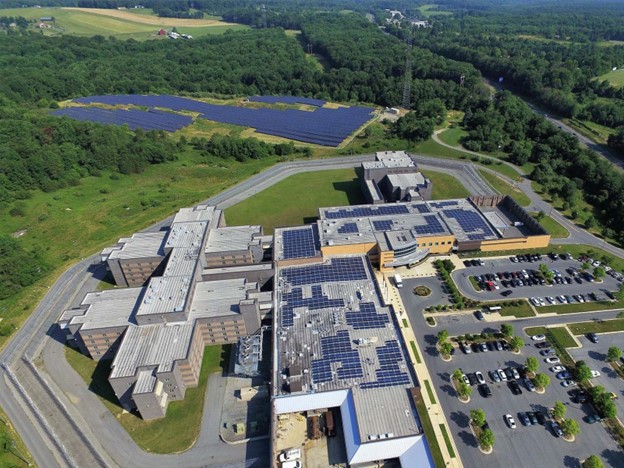
The Montgomery County Correctional Facility (MCCF), located in Boyds Maryland (near Clarksburg), is responsible for the custody and care of male and female offenders who are either in a pre-trial status or serving sentences of up to 18 months.
Montgomery County has installed a Microgrid Project at Montgomery County’s Correctional Facility (MCCF), as part of a comprehensive effort to ensure the resiliency of critical public services during major electric distribution system outages. MCCF is a correction and rehabilitation facility with capacity to house over 1,000 incarcerated persons.
The project includes multiple clean energy technologies integrated to operate seamlessly. The microgrid will reduce greenhouse gas emission by more than 950 metric tons annually, the equivalent of taking 200 cars off the road. The project design includes a 220 KW Combined Heat and Power (CHP) system combined with existing generators and a cyber security system. Along with the existing back-up diesel generators, the CHP system will have the ability to power the facility for an indefinite period.
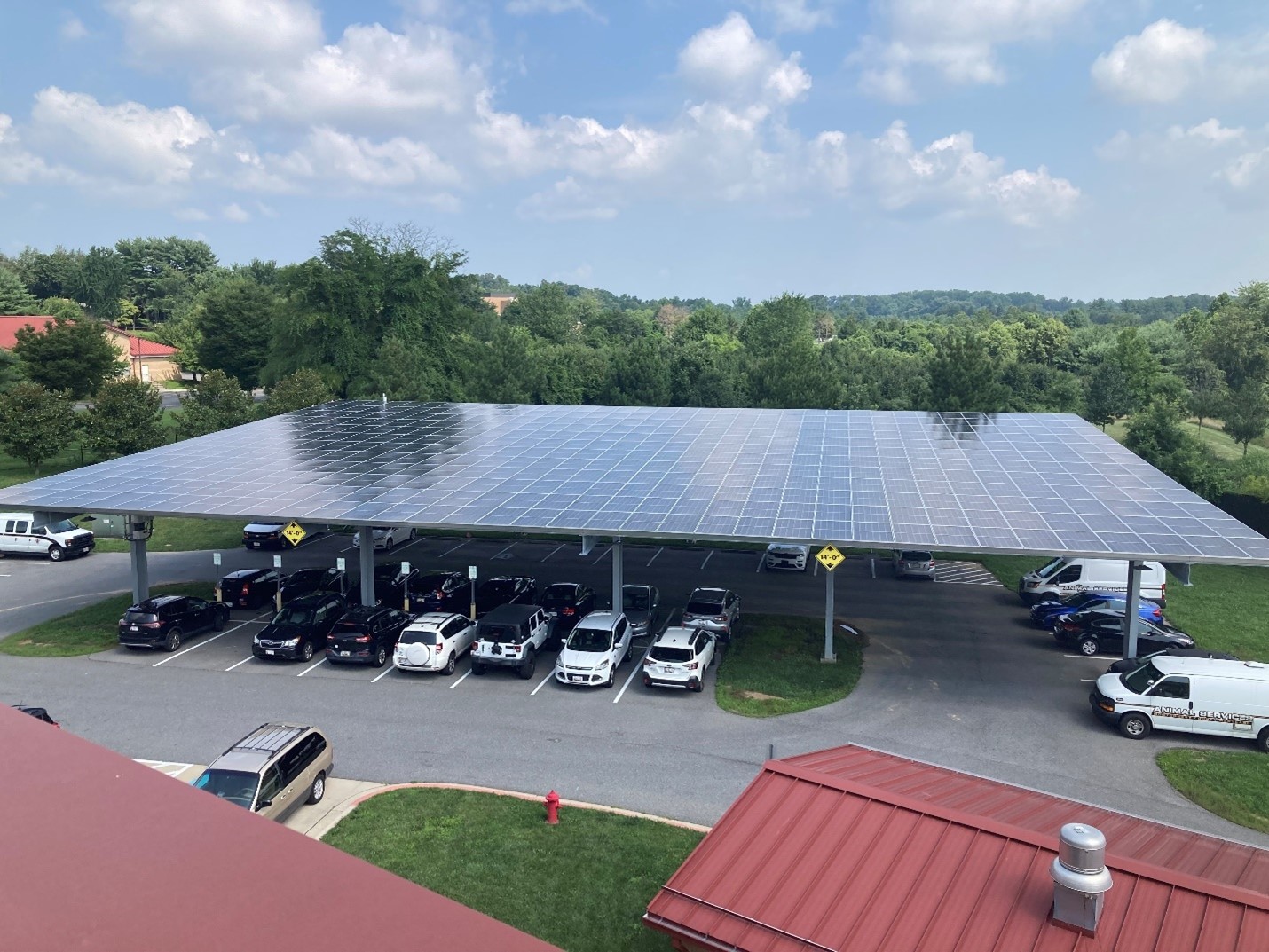
The Montgomery County Animal Services and Adoption Center (MCASAC), operated by the Office of Animal Services, provides high-standard sheltering and care to the homeless, abused, and neglected animals in our community and ensures the safety and welfare of the county’s citizens. We are the County's only open-admissions, municipal shelter.
The Center’s doors are open to all animals in need from dogs and cats to farm animals, wildlife, and exotics. Trained staff provide animals with daily care, mental and physical enrichment, health and wellness checks, and more. Through adoptions, spay and neuter assistance, vaccination clinics, education and outreach, the Center serves as a critical community resource to promote and advocate for responsible pet care. With community support and partnerships with other animal-welfare groups, our Foster, Rescue and Volunteer programs enhance and save the lives of even more homeless animals.
Montgomery County is committed to providing exceptional services to all residents of the County. This includes the County’s animal population. In the case of a major utility outage, hurricane, snowstorm, etc. the County is providing shelter and care for pets that may be displaced during an emergency.
The MCASAC facility microgrid received notoriety in 2023, when a small plane crashed into high electrical power lines and shut down the entire region for many hours. The microgrid immediately kicked in and continued operations without anyone noticing.
Microgrids - Resiliency Hubs
The Bette Carol Thompson Scotland Neighborhood Recreation Center is located within the 10-acre Scotland community, between Seven Locks Road and I-270. The center is nestled in a community that originated as one of the earliest African American settlements in Montgomery County. The community's 100 townhomes now house a diverse and multi-cultural population within the larger Potomac area.
Completely rebuilt in 2014, the recreation center offers residents of all ages a variety of programs and experiences. Among them are yoga, sports, cooking, music, dance, community celebrations and seasonal events.
The County along with funding from the Maryland Energy Administration designed and built the County’ first Resiliency Hub. The first of many small microgrids to be implemented in the County, was designed to support the local community with emergency services during a prolonged grid outage. Residents have a location that is close to where they live to shelter in place during a winter or summer emergency where the electrical grid goes down. The residents can use refrigeration services to store critical medicine, charge phones and computers to maintain contact with family and friends.
The County plans to replicate this project at over 22 other locations spread across the County to service many of the underserved communities in the County.
Solar
For a list of Solar Photovoltaic (PV) projects - go to Solar Map.Combined Heat and Power
Combined Heat and Power systems (CHP) provide onsite electrical generation, generally at a lower cost than buying power from the electric grid. In addition, they also have the ability to provide heat to use in other systems such as building heating and domestic hot water. When the heat from a CHP system is used, the system can be even more efficient. Common CHP systems can have an overall system efficiency of 70% or greater.
The Montgomery County Pre-Release Center was chosen as a building to install a “Combined Heat and Power” (CHP) system as there is a constant base electrical load as well as a need for the CHP heat for domestic hot water. This facility is occupied and used 24 hours a day. The CHP system will provide electrical generation as well as supply domestic hot water to the building. Any heat not used by the domestic hot water will be used for building heat when conditions allow.
The CHP system at Pre-Release is a Capstone Model C65, 65kW (nominal). The microturbine will use natural gas to generate 65 KW of electricity and utilize the waste heat for domestic water heating and building space heating in the wintertime.
The MLK Swim Center was chosen as a building to install a “Combined Heat and Power” (CHP) system as there is a constant base electrical load as well as a need for the CHP heat for heating the indoor pool water. This facility is occupied and used 18 hours a day year-round (except public holidays). The CHP system will provide electrical generation as well as supply hot water to heat the pool(s). The heat recovery from the Dectron units will continue to be utilized. The CHP system is a reciprocating engine (Recip) system, 75 kW (nominal). The Recip will use natural gas to generate approximately 75 kW of electricity and utilize the waste heat for pool water heating.
The CHP system serves the hot water needs for the main pool area, domestic hot water, Dehumidification units and the air handling unit in the boiler room. The new hot water piping after the heat exchanger would be routed to the teach pool area to provide hot water to the teach pool, teach pool spa and the hydrotherapy spa. The existing electric pool heaters serving the teach pool, teach pool spa and the hydrotherapy spa will remain in place as back-up systems.
Electric Vehicle Charging
The County is developing a comprehensive plan to install electric vehicle (EV) charging stations at over 200 County facilities. These charging stations will be available to service both County and private vehicles.


